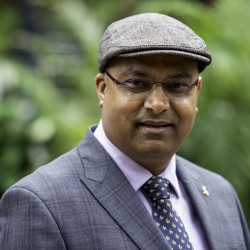Fun climate change education programmes could boost interest in STEM subjects
Make climate change education technology-based and fun from the offset to help reverse the declining interest in Science, Technology, Engineering, and Mathematics (STEM) subjects, say the authors of a new study from the University of Surrey.

Researchers from Surrey's Global Centre for Clean Air Research (GCARE) developed 'Heat-Cool' – a technology-enhanced learning programme that increased climate change literacy among 79% of primary school students and 62% of secondary school students.
Heat-Cool encouraged pupils to use infrared cameras to explore and learn about the urban heat island – a phenomenon where urban built-up areas lacking green spaces experience higher temperatures than the surrounding rural areas.
Professor Prashant Kumar, lead author of the study, the founding Director of GCARE and the Co-Director of the Institute for Sustainability at the University of Surrey, said:
"Arming our children with the necessary knowledge and skills to understand and eventually help fight climate change is critical to nursing our planet back to health. Our study suggests that a playful and interactive education programme such as Heat-Cool is not only fun for our children, but it generates an interest in climate change and, importantly, it also stimulates an interest in STEM subjects."
The study monitored the learning outcomes of 103 students from two cohorts (years 5-6 and 7-9) who participated in five Heat-Cool activity sessions. The pupils' climate change literacy was assessed through quizzes before and after the sessions. Knowledge on climate change increased by 9.4% in primary school children and by 4.5% in secondary school children.
In the sessions, the pupils took more than 2,000 infrared images, which the researchers categorized into 13 common themes. Interestingly, primary school children tended to create selfie images, while secondary school pupils were more engaged with their physical environment.
Co-author Associate Professor Sebastian Pfautsch from Western Sydney University in Australia said:
“It is great to see the positive effect of our climate change education programme. Every child should have access to it, empowering them to become earth stewards.”
The study has been published by Renewable and Sustainable Energy Reviews.
###
Note to editors
The University of Surrey is a world-leading centre for excellence in sustainability – where our multi-disciplinary research connects society and technology to equip humanity with the tools to tackle climate change, clean our air, reduce the impacts of pollution on health and help us live better, more sustainable lives. The University is committed to improving its own resource efficiency on its estate and being a sector leader, aiming to be carbon neutral by 2030. A focus on research that makes a difference to the world has contributed to Surrey being ranked 55th in the world in the Times Higher Education (THE) University Impact Rankings 2022, which assesses more than 1,400 universities' performance against the United Nations’ Sustainable Development Goals (SDGs).
Reference: Kumar, P., Sahani, J., Rawat, N., Debele, S., Tiwari, A., Emygdio, APM., Abhijith, KV., Kukadia, V., Holmes, K., Pfautsch, S., 2023. Using empirical science education in schools to improve climate change literacy. Renewable and Sustainable Energy Reviews 113232, Online link: https://doi.org/10.1016/j.rser.2023.113232
Professor Prashant Kumar is available for interview upon request.
For more information, please contact the University of Surrey's press office via emailing mediarelations@Surrey.ac.uk
Media Contacts
External Communications and PR team
Phone: +44 (0)1483 684380 / 688914 / 684378
Email: mediarelations@surrey.ac.uk
Out of hours: +44 (0)7773 479911
